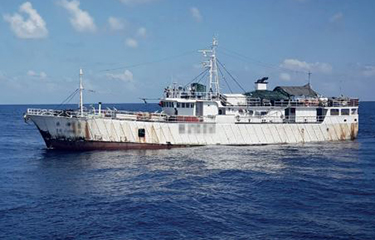Pingtan Marine, Dalian Ocean hit with US sanctions

The U.S. government has sanctioned Dalian Ocean Fishing and Pingtan Marine Enterprise, claiming they have engaged in illegal fishing and labor abuse.
The sanctions, issued by the U.S. Treasury Department’s Office of Foreign Assets Control on 9 December, 2022, affect over 150 vessels operated by the two companies and also target Dalian Ocean Fishing Chairman and General Manager Li Zhenyu and Pingtan Marine Founder, Chairman, and CEO Xinrong Zhuo, as well as their other fishing-related companies, including Fuzhou Honglong Ocean Fishing Co., Ltd. (Honglong), which is owned by the Zhuo family. The designation freezes any U.S. assets of the companies and individuals and bars them from doing business in the United States, or in the case of Zhenyu and Zhuo, from entering the U.S. In total, 157 fishing vessels were sanctioned by the U.S.
“Treasury condemns the practices of those sanctioned today, which often involve the abuse of human rights, undermine fundamental labor and environmental standards, and harm the economic prospects of local populations in the Indo-Pacific,” U.S. Under Secretary of the Treasury for Terrorism and Financial Intelligence Brian E. Nelson said in a press release. “These designations demonstrate how seriously we take the problem of illicit fishing and our commitment to holding the perpetrators of serious human rights abuses to account.”
The U.S. government’s actions were authorized under the Global Magnitsky Human Rights Accountability Act of 2016, which authorizes the U.S. government to sanction foreign government officials deemed to be human rights offenders. It comes in response to a memorandum issued by U.S. President Joe Biden on 27 June, 2022, focused on combating illegal, unreported, and unregulated (IUU) fishing and associated labor abuses. The Office of the U.S. Treasury Secretary said the announcement was timed to land on International Anti-Corruption Day and Human Rights Day.
“Today’s action demonstrates the U.S. government’s ongoing effort to impose tangible and significant consequences on those engaged in serious human rights abuse, including on those vessels engaged in illegal, unreported, and unregulated (IUU) fishing,” it said. “These designations are the latest U.S. government actions in an ongoing effort to deter IUU fishing and associated human rights abuses in the international fishing industry.”
Other Chinese fishing entities affected by the sanctions include Fujian Provincial Pingtan County Ocean Fishing Group Co., Ltd. (Pingtan Fishing); PME, Heroic Treasure Limited, and Mars Harvest Co., for being owned or controlled by Zhuo; the British Virgin Islands-registered Merchant Supreme Co., for being owned or controlled by PME; Hong Kong-registered Prime Cheer Corporation, for being owned or controlled by Merchant; PRC-registered Pingtan Guansheng Ocean Fishing Co. (Guansheng), for being owned or controlled by Prime; Fujian Heyue Marine Fishing Development Co., Ltd. (Heyue), for being owned or controlled by Guansheng; and Pingtan Fishing, for being owned or controlled by Heyue.
This marks the first time the U.S. Treasury Department has sanctioned a business listed on the Nasdaq Stock Exchange. Fuzhou, China-based and Cayman Islands-headquartered Pingtan Marine landed on the Nasdaq through a reverse merger, a process by which companies can enter American capital markets without the due diligence required before an initial public offering. In 2012, China Equity Growth Investment (CGEI) merged with China Dredging Group Co. and Merchant Supreme Co. on the same day. CGEI, the surviving company, then changed its name to Pingtan Marine Enterprise Limited in February 2013.
Over the past year, Pingtan has been repeatedly sanctioned by the Nasdaq Stock Exchange for late publication of its results and inadequate reporting of corporate activity. And on 7 December, 2021, the U.S. State Department issued a notice that it had “revoked more than 15 visas for those complicit in IUU fishing who also have links to human trafficking, including associates of Pingtan Marine Enterprise.”
As part of its sanctions, the Treasury Department has ordered U.S. citizens and corporations to wind down their financial contracts and other agreements related to PME, and to divest or transfer all debt or equity of PME, to a non-U.S. person by 9 March, 2023.
The company has made no announcement to investors about the sanction and didn’t respond to a request from SeafoodSource for comment. SeafoodSource previously contacted Nasdaq for comment but did not receive a response.
Pingtan Marine's operations are closely entwined with those of Fuzhou Honglong Ocean Fishing Company, which was founded in 1995 by Zhuo Xinrong, but which is currently owned by Zhuo Longjie, his brother. The U.S. sanctions also targeted that company “for having materially assisted, sponsored, or provided financial, material, or technological support for, or goods or services to or in support of, PME.”
“Honglong, which is owned by Zhuo’s family, provided PME with millions of dollars’ worth of fuel and supplies for their vessels,” the U.S. Treasury Department said. “PME and Honglong have used each other’s vessels to collateralize loans worth hundreds of millions of dollars, and PME claims exclusive operating rights to 20 of Honglong’s vessels.”
Pingtan Marine has nearly tripled the size of its fleet in recent years and the Chinese government continues to authorize Pingtan Marine to operate abroad. The Treasury Department said, in 2021, Pingtan Fishing received a USD 19 million (EUR 18 million) subsidy from the Chinese government “as an incentive to develop its distant-water industry to satisfy China’s demand for seafood.”
“Its vessels have been involved in serious human rights abuse and implicated in IUU fishing and other illegal activity in Indonesia, East Timor, and Ecuador. This includes the 2017 seizure of a Honglong-owned vessel and the arrest and imprisonment of the vessel’s crew after the Ecuadorian Navy found it had illegally transshipped more than 6,600 shark carcasses, including from endangered species, through the waters of the protected Galapagos Marine Reserve. Additionally, in 2016, an Indonesian court ordered a moratorium on PME’s fishing activities and the impoundment of its affiliate vessels in Indonesia following allegations against an affiliated company that included human rights abuse,” it said. “Crewmembers, already enduring miserable conditions, overwork, and extreme isolation aboard Pingtan Fishing-owned vessels, have reported instances of physical violence and forced labor. In one case, after crewmembers reportedly contacted their families for the first time in seven months and learned they had not been paid, a crewmember’s request to leave the ship was denied, and food was withheld for three days. Crews that had completed their contracts, but who were forced to continue working for months in light of Covid restrictions, learned only later that they were never paid at all. Still others reported physical abuse. On another ship, a grossly negligent response to an accident contributed to the death of a crewmember after it took over two weeks to get the seriously injured crewmember to see a doctor aboard another ship. In another case, crewmembers on one ship only learned of the global pandemic in May 2020, after they arrived in port for the first time in over a year.”
The Treasury Department alleged similar abuses had taken place onboard some of the 32 fishing vessels owned and managed by Dalian Ocean Fishing. The company has previously been the target of sanctions from the U.S. Department of Homeland Security.
“In February 2019, one of DOF’s fishing vessels, Long Xing 629, went to sea with a crew of 24, operating in the Pacific Ocean until April 2020. While the Long Xing 629 was licensed to catch tuna during its voyage, it also was reportedly engaged in illegal shark finning, taking over 700 kilograms of fins, including from endangered sharks. After 13 months without a port visit, with average workdays lasting 18 hours and living off expired food and brown desalinated seawater, five crewmembers had died; at-sea refueling and transshipments of fish to refrigerated cargo vessels known as ‘reefers’ allowed the ship to operate without interruption. The bodies of three crewmembers who died at sea were dumped into the ocean rather than repatriated home. When the surviving crewmembers returned home, they were diagnosed with malnutrition and received only a fraction of their promised pay. They have since described deceptive recruiting practices, the confiscation of identity documents, punishing work, and physical abuse,” it said. “Subsequent investigation found that similar abuses occurred across DOF’s fleet, with widespread reports of physical assault, malnutrition, overwork, withheld pay, and five more crewmember deaths. Based on their contracts, crewmembers who left the ship would forfeit their salaries while still owing the recruiting fees they had agreed to pay out of future earnings, leading to the potential for intergenerational debt bondage. Other vessels stayed at sea for more than two years without a port visit, meaning no access to the outside world or any way to let others know of the oppressive conditions. Through all of this, DOF received almost USD 8 million [EUR 7.6 million] annually in [Chinese] government subsidies encouraging distant-water fishing.”
China Foreign Ministry Spokesperson Mao Ning, in response to a question from Russian media before the U.S. sanctions were published, said China is not violating international fishing regulations. Ning said China views any insinuation that China is not in compliance with international laws as interfering in its internal affairs and rejected any implication it had endorsed or sanctioned human rights abuses, according to The Hill.
“The U.S. is in no position to impose unwarranted sanctions on other countries or act as a ‘world policeman.’ China will act resolutely to safeguard its lawful rights and interests,” Mao said.
Photo courtesy of Environmental Justice Foundation






Share